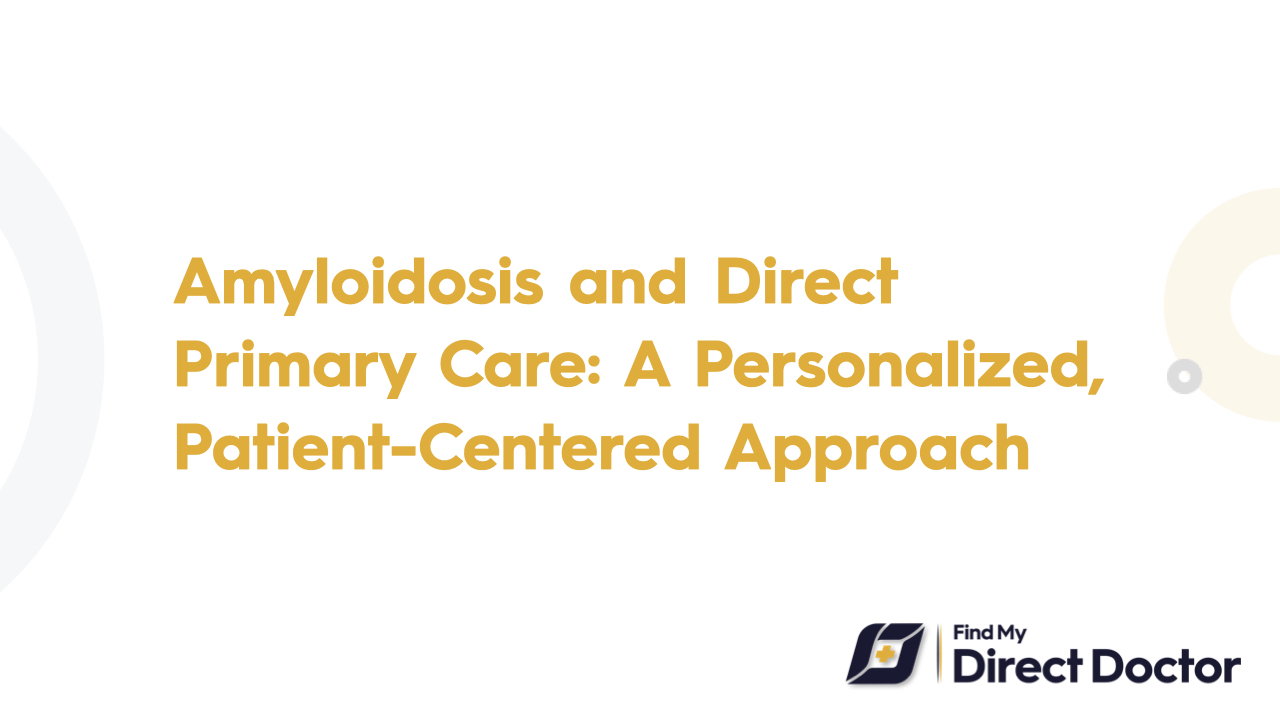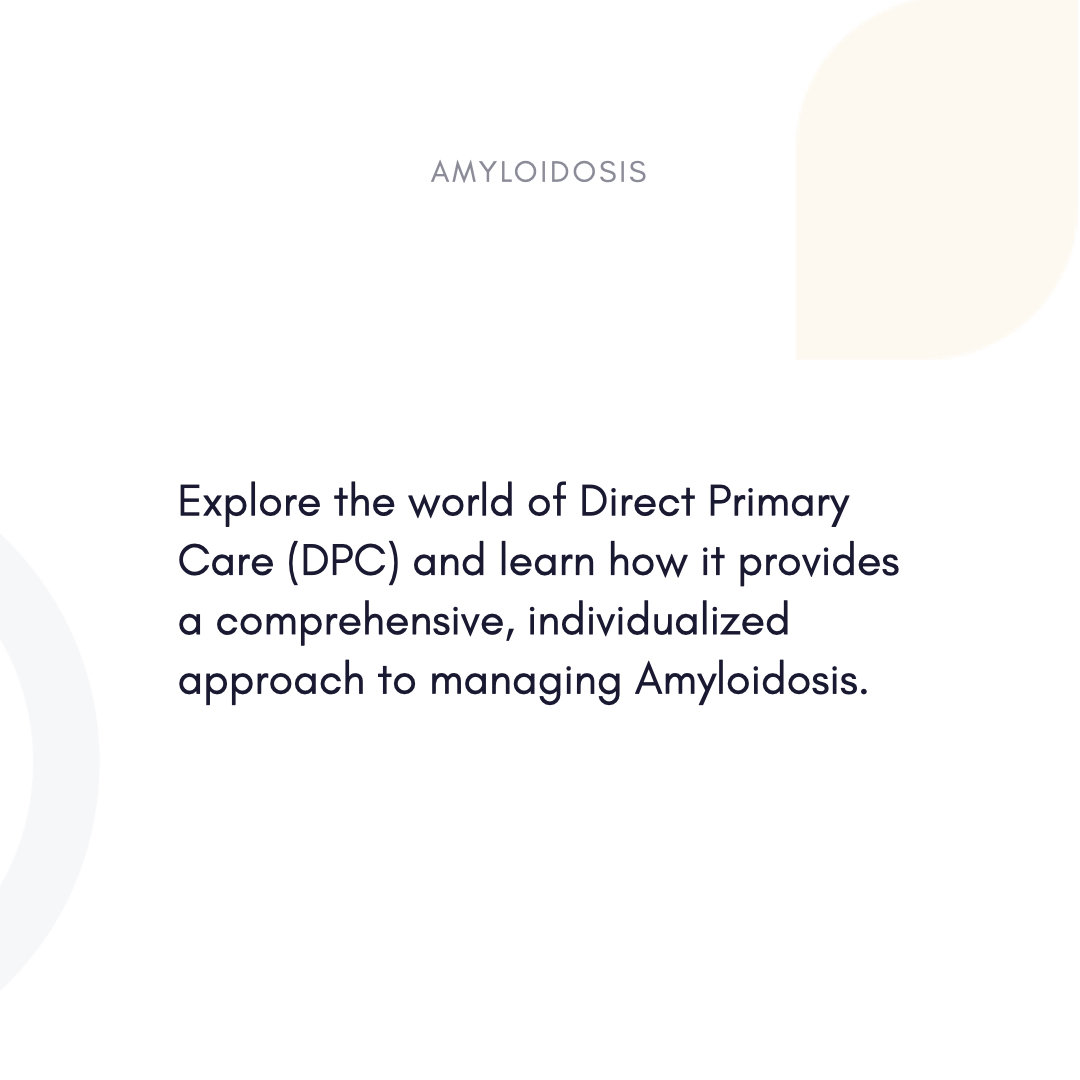Amyloidosis and Direct Primary Care (DPC): Personalized, Coordinated Care for a Complex Condition
A rare condition brought on by aberrant protein deposits (amyloid) in organs and tissues, amyloidosis causes systematic problems and increasing damage to organs. Managing this condition calls for exact diagnosis, multidisciplinary cooperation, and constant monitoring—challenges sometimes unmet in conventional medicine. Direct Primary Care (DPC) presents a patient-centered solution with affordable treatments, quick access to experts, and individualized support to raise standards of living and outcomes.

Knowing Amyloidosis: Main Difficulties
- Types: Primary AL; secondary AA; hereditary or age-related ATTR; localized forms
- Symptoms: Weight loss, kidney failure, heart arrhythmias, neuropathy—specific problems for organs
- Diagnosis: Genetic testing; serum free light chain tests; biopsy stained with Congo red
- Complications: Organ failure, neuropathy, carpal tunnel syndrome, digestive problems
How DPC Improves Management of Amyloidosis
Providing unlimited access to a primary care physician, Direct Primary Care (DPC) is a membership model (USD100–USD200/month). For those with amyloidosis, this means:
- No waiting for specialist coordination or urgent symptom evaluations
- Clear pricing including discounted labs, imaging, and drugs
- Medical, emotional, and logistical support for complicated needs combined in holistic treatment
1. Fast Diagnosis and Expert Coordination
- Targeted testing at reasonable cost: Urine protein electrophoresis, serum free light chain assays, cardiac biomarkers (BNP, troponin)
- Coordinating biopsies: Referrals for reliable pathologists to stain Congo red
- DPC-negotiated rates allow genetic counseling for hereditary forms
2. Individualized Treatment Approaches
DPC combines according to Amyloidosis Foundation recommendations:
- Disease-modifying therapies:
- AL amyloidosis: Stem cells or bortezomib, daratumumab chemotherapy
- ATTR amyloidosis: Tafamidis, patisiran, or inotersen stabilizes proteins
- Symptom management: Diuretics for heart failure, gabapentin for neuropathy, GI motility agents
- Lifestyle changes: Low-sodium diets, physical therapy, pain management
3. Ongoing Advocacy & Monitoring
- Regular echocardiograms, kidney function tests, and liver panels track organ performance
- Support for caregivers: Training on handling mobility problems or treatment side effects
- Insurance navigation: Help with prior authorization for expensive treatments
DPC's Advantages for Amyloidosis Sufferers
Improved Continuity of Service & Accessibility
- Regular observations: Early symptom recognition and timely treatment changes
- Less paperwork: Doctors focus on treatment rather than insurance billing
Customized, Multidisciplinary Treatment
- Tailored programs: Address disease variability (e.g., AL vs. ATTR)
- Professional teamwork: Coordination with hematologists, cardiologists, and neurologists
Affordable Remedies
- Medications: Chemotherapy drugs at wholesale rates save 30–50%
- Imaging: Cardiac MRIs for USD500 instead of USD1,500+
Individualized Management of Amyloidosis in DPC
Direct patient-provider relationships allow DPC to raise the quality of treatment, according to the American College of Physicians (ACP). For amyloidosis, this translates as:
1. Regular Monitoring and Corrections
- Track disease development using imaging and biomarkers (NT-proBNP, troponin)
- Adjust chemotherapy dosages based on real-time feedback
2. Empowerment & Patient Education
- Teach patients about amyloid types, self-monitoring, and triggers
- Collaborative decision-making: Tafamidis vs. clinical trials
3. Cross-Domain Integration
- Unified care plans with cardiologists, oncologists, and geneticists
- Palliative care coordination for advanced cases
Personal Success Stories from Real Life
- Case 1: 58-year-old Sarah skipped dialysis for two years with DPC-coordinated chemotherapy and kidney-protective diets
- Case 2: 67-year-old John reduced neuropathy pain by 70% using gabapentin and physical therapy scheduled through DPC
FAQs: DPC and Amyloidosis
- Q: Can DPC prescribe tafamidis and other specialty medications?
A: Yes! DPC doctors manage prescriptions and coordinate financial aid programs
- Q: What approach does DPC take to genetic testing?
A: Cash-pay rates start at USD200 for ATTR gene panels (vs. USD1,000+ with insurance)
- Q: Can DPC help access clinical trials?
A: DPC doctors assist in finding and enrolling patients in amyloidosis studies
Why DPC Will Change Amyloidosis Treatment
- Breaks silos: Coordinates care among specialists to minimize delays
- Reduces costs: Transparent pricing for critical tests and treatments
- Improves adherence: Frequent visits ensure patients stay on complex regimens
How DPC Specifically Improves Management of Amyloidosis
Amyloidosis needs accuracy and flexibility. DPC's approach fits ACP recommendations by:
- Prioritizing early diagnosis: Rapid access to biopsies and biomarker testing
- Empowering patients: Education on disease progression and treatment options
- Simplifying complexity: One doctor manages treatment from chemo to palliative care
Navigate Amyloidosis Confidently with DPC
Although amyloidosis is complicated, you don’t have to face it alone. DPC partners with you at every stage, ensuring timely diagnostics, affordable treatments, and compassionate support.






